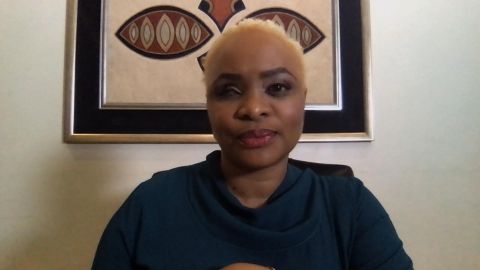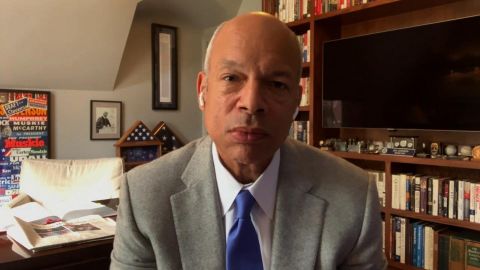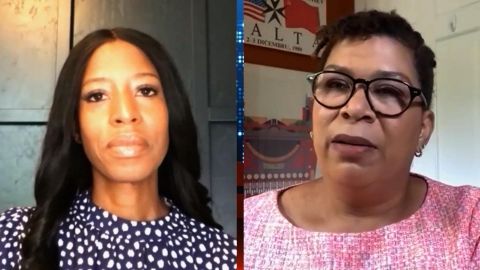Read Transcript EXPAND
CHRISTIANE AMANPOUR: And now back to the big story of the week, which is the Republican Convention and the case of President Trump and four more years. Mia Love broke a glass ceiling in 2015 when she became the first black Republican congresswoman. The daughter of Haitian immigrants and a Mormon convert, Mia Love represented Utah’s 4th District, until she lost her seat back in 2019, last year. Love is a proud conservative. Indeed, she spoke at the 2012 Republican Convention, but, today, the question of whether she supports her party’s president is not an easy one for her to answer. And here she is explaining why to our Michel Martin.
(BEGIN VIDEOTAPE)
MICHEL MARTIN: Thanks, Christiane. Mia Love, thank you so much for talking with us.
FMR. REP. MIA LOVE (R-UT): Thank you for having me. I’m happy to speak to you.
MARTIN: I’m happy to speak to you, too. I do want to talk about the conventions, both conventions. But I want to kind of go back big picture before that.
LOVE: Yes.
MARTIN: And I wanted to ask you, looking back at the last three years, what do you think the Trump administration has done well, if anything, and what do you think the Trump administration has done poorly, if anything?
LOVE: Well, let’s talk about the negatives first of all. So, I mentioned in my concession speech that it seems to me that the administration is incredibly transactional. And as you saw in the convention last night, all of the people that were speaking have been people that have been supportive from day one. He has this mentality that, you’re either all in with me or you’re all out. And for some Republicans, that has been difficult, because there are principles and platforms that we believe in. And when you leave those platforms or you turn away from those platforms, as a member of Congress, and even as a Republican or a citizen, it is your duty and responsibility to say, wait a minute, that’s not what we believe in.
MARTIN: And I remember, in part, you said in 2016 part of the reason you didn’t go to the Republican Convention is that you were representing your constituents, who were still ambivalent.
LOVE: Right. And so it doesn’t mean — I mean, you can’t take those things personally, and I think the administration does take some of those things personally. Also, I don’t think there is really an American that agrees 100 percent with the president’s Twitter feed and the language that he uses. It can be incredibly divisive. The only people that I think probably are OK with that are the ones that are really on the fringe and, really, I mean, they’re just fed up and they will go with him at all costs and justify anything that he says. So, my issue with the president has been mainly a personality issue. So, let’s talk about what he’s done correctly. I think that foreign policy, the tough mentality with Kim Jong-un in North Korea, with terrorist groups, with even Putin in terms of trying to say, look, you’re not going to mess with the United States, that brash bulldog, has been good for us. I think that the actions that he’s taken in making sure that he took out terrorists has been good for us. I also think that the economy pre-COVID was doing really well for all Americans. In the state of Utah, we had less than 2 percent unemployment and dropping. So, that raised wages, and people were doing well. Black communities were doing better. Criminal justice reform has been a great thing for the administration. Funding HBCUs permanently has been a great thing for the administration. I worked on tax reform. Signing some of these bills into law has been really good. So, policy-wise, I think that we and the economy as a whole was doing really well. So, when he actually says, if you want the economy to come — to go back pro-COVID, I’m the one that can do it because I have done it before, those are the positives.
MARTIN: Are you going to vote for him?
LOVE: I have not made that decision. I actually think that it’s important for me to continue to give myself as much time as possible before I commit, because you never know what’s going to end up happening. But I do — I can tell you this. For the policies that I know of with Joe Biden and what he believes in, I will not be voting for Joe Biden. I’m not going to be one of the Republicans that supports Joe just because of my issues with the president.
MARTIN: So, you gave us a lot to think about. Briefly — I don’t want to spend too much time on tone, because conventions are television shows. They have been television shows for years. Give me your take on what the Democrats presented shown and then give me your take on what the Republicans have presented so far, tone, because you raised tone as part of your issue with the way the president’s conducted himself in office.
LOVE: And you know what? It is. It is about tone, because I think that Americans are just tired of the doom and gloom. I believe they’re tired. People are tired. They have been stuck at home. They have had to deal with a health crisis and then had to deal with not — losing so much work, not being able to feed — it’s just too much doom and gloom. I think the Democrats lost an opportunity to talk about some of the positives and to talk about what they’re going to do to help the country get back. A lot of the speeches were recorded, several — some of them two weeks in advance, and I think it lost the opportunity to really address or to flow freely on some of the issues that were present. So I think that that was a mistake. I was pleasantly surprised — I was keeping my fingers crossed hoping we wouldn’t talk about the president as much as we would talk about the American people. I think that people like Senator Tim Scott was phenomenal, because he talked about the American dream. His tone was about — I mean, it was about from cotton to Congress and how that was his — that was the American dream that was achieved. His grandfather that couldn’t even read now has a grandson, was able to see a grandson become a member of Congress. It spoke to me, because my parents immigrated from Haiti, and they had nothing, $10 in their pockets and saw their daughter become the first black Republican in Congress. That was their American dream. It had nothing to do with health — with wealth. It has everything to do with an ideal, that you can, through hard work and education, be something way beyond what you — what you envisioned for yourself and for your children.
MARTIN: Both nominees have said, in one way or another, don’t just watch what I say, watch what I do. And I think a lot of the Democrats felt that their presentation was its own message of optimism, the diversity, the going around the country, the display of different kinds of people, all different kinds of people in the roll call, showing people all over the country, the calamari, that that was its own message. And as a champion of diversity in your own party, you didn’t see that? You didn’t…
(CROSSTALK)
LOVE: No, no, I saw some of it, but I think it was — there was a lot of, this is how the president has hurt America. And I didn’t see very much — as a person that’s looking for solutions, I didn’t see very much of those — what are the policies that are going to change? All I kept saying is — all I kept seeing is, this has to change. This is what the president has done. I’m aware of the negative effects of the administration, as a Republican. I’m aware. But what are you going to do to really change it? What are the policies? And I just don’t have any — any solid policies, whereas, when I’m looking at Tim Scott, who is a good friend, full disclosure, a very good friend of mine, but I saw him work on police reform policies. And he even stated, which I think is going to resonate with Americans, is that they would rather have the issue than the solution.
MARTIN: So, let’s talk about the policy. Let’s sort of talk about the substance. You have identified a couple of areas similar to what many convention of the speakers identify as what you consider to be areas of accomplishment. Let’s talk about the president, President Trump. In the first three years, he brought about or what occurred under his administration slightly less employment growth than his predecessor did, the same gross domestic product growth, slightly better stock market growth, the same wage growth. This was all pre-pandemic. And now, of course, we see that we have record unemployment, the worst unemployment since the Great Depression. Is that really a record of accomplishment?
LOVE: Actually, a better economy, more people finding jobs. Look, I am — this is — I’m not an apologist for the president. I have not been. But that’s an area where he actually has done well. I have seen it in our state. I have seen it across the country. That was one area that, no matter where — what we talked about, that was one area that we kept saying, you need to focus on that. And even Democrats kept saying, if he focused on that, instead of the language that he was using, he would actually do a little bit better. So, that is an area that I do think, yes, that he has done well. Slightly better is better than a decline. And I think it was a little bit more than slightly better. We saw it in our — like, in our state. We saw the economy growing. We saw the projections. And it’s — people were bringing home a little bit more, were making a little bit more, were able to get more jobs. And that’s always a good thing.
MARTIN: And in the foreign policy realm, no concessions from North Korea. Yes, it’s true that he’s reimposed sanctions. He’s reimposed sanctions on Iran. No concessions from North Korea. Met with the North Korean dictator without any prior concessions at all, something no previous president has done. Has achieved no concessions since those meetings, and says that he and the North Korean dictator fell in love. Has yet to confront the president of Russia about bounties leveled on troops in Afghanistan. And I will also add to that 70, at least 70 Republican national security officials released a letter saying that the country is now less safe than it was before he took office. What’s your take on that?
LOVE: Well, I don’t know if we are less safe. And I’m not going to agree with everything that the president has done when it comes to foreign policy. I don’t agree with the lovefest. But there are the — the previous administration in terms of crossing lines, I was there in Congress when the Iran deal was done. That was done without Congress at all. That was done — that was giving Iran about a fourth of its GDP back to them without having any concessions on stopping the terrorist attacks. I was there watching that. And that was really — I think that that was incredibly harmful. So I think that, when we’re talking about some of these things, talking about North Korea and making sure that we denuclearize North Korea, that’s important. I don’t agree with some of the things in terms of removing ourselves. We have become a little bit more isolationist, instead of being a little bit more engaged and involved. I don’t agree with that.
MARTIN: Does he show you any inclination of being willing to reach out beyond the people who have already supported him all these years? Has he given you any indication of any willingness to do that, even within the Republican Party?
(CROSSTALK)
MARTIN: Yes.
LOVE: No. I mean, again, this is the precedent that, I mentioned earlier, you’re either all in with him or you’re all out. And I think that that’s a detriment, because, when you are the leader of the nation, your job is not just to represent your followers, not just to represent Republicans, but to represent Americans.
MARTIN: And where does that leave somebody like you? And where does that leave somebody like former General Jim Mattis, or the former secretary of state, or the former heads of all these — other Republican people who tried to — Republican national security officials, distinguished in their fields, many of them with distinguished careers, someone like yourself, a rising star, who has — in the party, a groundbreaker, a glass ceiling breaker, and yet because of points of difference on policy issues, legitimate points of difference, find yourself without a party. Where does that leave you?
LOVE: Here’s where it leaves me, as a daughter of parents who immigrated and who worked hard, who are legitimately Americans also. It leads me to saying, I am not going to put all my eggs in that basket, that I’m not going to follow a person blindly, that I’m going to stick with my principles and my beliefs, and I’m going to continue to say things the way that I believe that — the things that I believe in. I’m not going to follow at all costs, just because the person says that they are Republican and they are the president of the United States. I have always maintained that, when I was a member of Congress, it was not my job to follow behind him, but it was his job to follow behind us, because us is the American people. That’s what it means to be government for the people, by the people, is that you are not — being a leader is not just saying, all of my decisions are correct, but it is representing the people that put you in office.
(CROSSTALK)
MARTIN: Where does that leave you? Yes.
LOVE: With not pulling away from the things that I believe in. What that leaves me is being honest, as a mother, and as a wife and as an American, to continue to say, these are the things I agree with, these are the things I disagree with. And if you don’t like me, then that’s your business. But it is, I put you there. It is, you are to represent me. You are not my boss. I am yours.
MARTIN: Can I get a reaction to something that Nikki Haley, the former U.N. ambassador, former South Carolina governor, a person — a woman of color herself, said in her remarks to the convention. She said: “In much of the Democratic Party, it’s now fashionable to say that America is racist. That is a lie. America is not a racist country.” What is your reaction?
LOVE: My reaction to that is, the more we talk about it, I thought — I prefer to have the Tim Scott approach to it. I understand what she’s saying. And I think that what she probably should have said is, maybe we’re not where we were in 1800s. Maybe we were not where we were in the 1900s. There are some things that we can do better. And so that would be my reaction to that. You can’t completely ignore some of the things that we have to work on.
MARTIN: As we have noted, you are a glass breaker. You were the first African-American — black Republican woman elected to the Congress. Kamala Harris is the first black woman, the first woman of color on a major-party ticket. And she has been — I don’t know another way to say it, but conservative media has conducted an assault on her. I mean, they have directed a sexual smear campaign at her. I mean, they have questioned her right to run, a birth — a so-called — another birther attack, claiming that she is — some obscure legal theory from the 19th century claiming that she’s not qualified to run. She was born in the United States. Of course she’s qualified to run. I just wonder, even though you’re not of the same party, does her ascension to the ticket mean anything to you? And do the assaults on her mean anything to you?
LOVE: Of course. Of course it does, because I witnessed some of that. You know, being a black woman in America is difficult as it is. And I remember a lot of assaults against me. And it was from — actually from both. And we always have to work harder to prove ourselves when we’re articulate. It’s really interesting. It’s like, we always get, hmm, that person’s really articulate. Like, well, I’m an educated American. Somebody — no one gave this to me. No one gave this. You earn your way through. And so I think that, of course, I feel it, because I think that I witnessed that myself. And here’s what I always say. Attack the policies. Attack the politics, not the person.
MARTIN: Do you have any advice for her?
LOVE: I would say to continue to just rise above it and push forward your policies. I think that there — I think it would — it would be better for her if she — if they got away from, this is what’s bad, and go towards, these are my solutions, this is my policy, this is how I’m going to fix things, and ignore it. And just — and one of the things that I agree with, actually, Michelle Obama about is, go high. Rise above it. And it’s really — again, really interesting is, when I first met Michelle Obama, she said: “I want you to know that I’m happy you’re here. Set the standard high. Set the standard high.” And so I would say for all women, all women of color, and for everyone, is to set the standard high, because we, as Americans, deserve better. We deserve better.
MARTIN: Mia Love, thank you so much for talking with us.
LOVE: Thank you so much. I appreciate it. This was fun.
About This Episode EXPAND
Christiane speaks with former Secretary of Homeland Security Jeh Johnson about the racial and political ramifications of the Jacob Blake shooting. She also speaks with Benji Backer, who is pushing the GOP to take action on climate change, and with Josina Machel, who highlights how COVID-19 has fueled domestic violence. Mia Love tells Michel Martin about the positives of the Trump administration.
LEARN MORE



